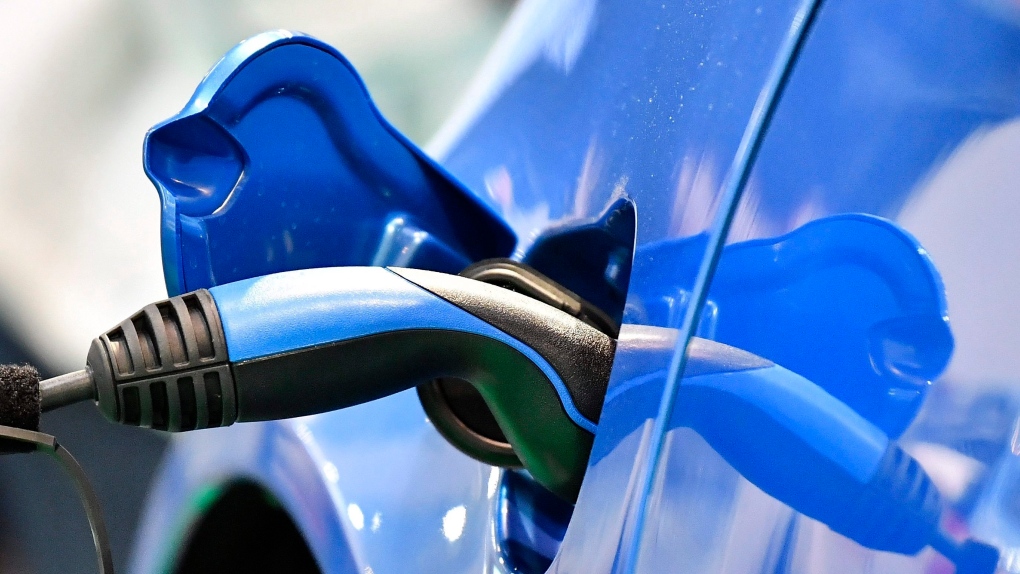Quebecers account for nearly half the sales of electric vehicles in Canada: why?
 FILE - In this Nov. 29, 2019 file photo, an electric car is charged at the Essen Motor Show fair for tuning and motorsports in Essen, Germany. (AP Photo/Martin Meissner, File)
FILE - In this Nov. 29, 2019 file photo, an electric car is charged at the Essen Motor Show fair for tuning and motorsports in Essen, Germany. (AP Photo/Martin Meissner, File)
Between 70 and 75 per cent of motor vehicles sold in Canada will have to be zero-emission vehicles (ZEVs) by 2030 if the federal government is to meet its greenhouse gas emission targets, according to a report by the CD Howe Institute earlier this month.
Currently, only 3.5 per cent of vehicle sales in Canada meet this criteria.
Nevertheless, a number of provinces are making efforts to ramp up electric vehicle sales — and it seems Quebec is leading the charge.
A whopping 46 per cent of registered electric cars in Canada are in Quebec, according to the Association des véhicules électriques du Québec (AVÉQ).
The highest per-capita rate of electric vehicle registrations is in British Columbia at 8.4 per cent; Quebec follows closely behind at 6.8 per cent.
“People in Quebec pay a lot more attention to the environmental impacts of their choices and always voice their opinion positively towards making those changes to help out,” said Simon-Pierre Rioux, president of AVÉQ.
This alone doesn’t always mean Quebecers will make the most environmentally-friendly choice, he notes.
“One of the reasons why we’re starting to see this change is because people are seeing that there is a financial advantage [to] driving an electric car,” he explained.
MONEY TALKS: REBATES
To incentivize more Canadians to buy greener cars, the federal government is offering rebates on the purchase of zero-emission and hybrid vehicles:
- $5,000 for battery-electric vehicles (BEVs), fuel-cell electric vehicles (FCEVs) and longer range plug-in hybrid electric vehicles (PHEVs);
- $2,500 for shorter range PHEVs.
Longer-range PHEVs have a higher battery capacity, meaning they can be powered by more electricity than shorter-range PHEVs.
The federal government defines longer-range hybrids as having a battery capacity of at least 15 kW/h — any capacity lower than that is considered shorter-range.
Quebec has also established provincial incentives, which can be combined with federal rebates for maximum savings:
- $8,000 for new BEVs, FCEVs and PHEVs;
- $4,000 for used BEVs and FCEVs;
- $600 for the purchase of home-charging stations.
“It’s really advantageous,” insists Rioux.
Other provinces and territories offer financial incentives as well, but none are as high as Quebec, he adds.
CTVNews.ca Top Stories

Can the Governor General do what Pierre Poilievre is asking? This expert says no
A historically difficult week for Prime Minister Justin Trudeau and his Liberal government ended with a renewed push from Conservative Leader Pierre Poilievre to topple this government – this time in the form a letter to the Governor General.
'I'm still thinking pinch me': lost puppy reunited with family after five years
After almost five years of searching and never giving up hope, the Tuffin family received the best Christmas gift they could have hoped for: being reunited with their long-lost puppy.
Wrongfully convicted N.B. man has mixed feelings since exoneration
Robert Mailman, 76, was exonerated on Jan. 4 of a 1983 murder for which he and his friend Walter Gillespie served lengthy prison terms.
Pickup truck driver killed by police after driving through Texas mall and injuring 5
A pickup truck driver fleeing police careened through the doors of a JCPenney store in Texas and continued through a busy mall, injuring five people before he was fatally shot by officers, authorities said.
Unifor members ratify new agreement with Canadian National Railway
Unifor said on Sunday that its members at Canadian National Railway (CN Rail) have ratified a new four-year collective agreement, averting a potential strike action.
6 adults, 4 children taken to hospital following suspected carbon monoxide exposure in Vanier
The Ottawa Paramedic Service says ten people were taken to hospital, one of them in life-threatening condition, following an incident of suspected carbon monoxide exposure Sunday morning in the neighbourhood of Vanier.
Two U.S. Navy pilots shot down over Red Sea in apparent 'friendly fire' incident, U.S. military says
Two U.S. Navy pilots were shot down Sunday over the Red Sea in an apparent 'friendly fire' incident, the U.S military said, marking the most serious incident to threaten troops in over a year of America targeting Yemen's Houthi rebels.
Big splash: Halifax mermaid waves goodbye after 16 years
Halifax's Raina the Mermaid is closing her business after 16 years in the Maritimes.
Second body recovered from site of B.C. landslide
The second resident of a home that was destroyed by a landslide in Lions Bay, B.C., last weekend was found dead Saturday, officials confirmed.
































